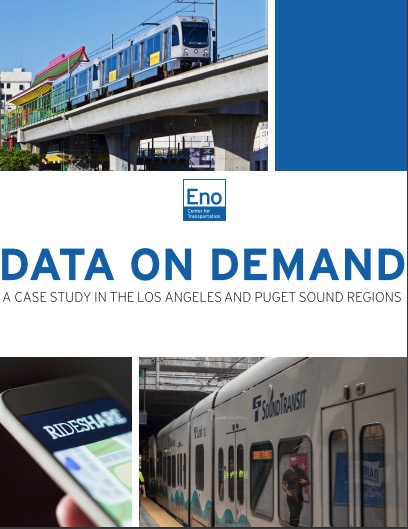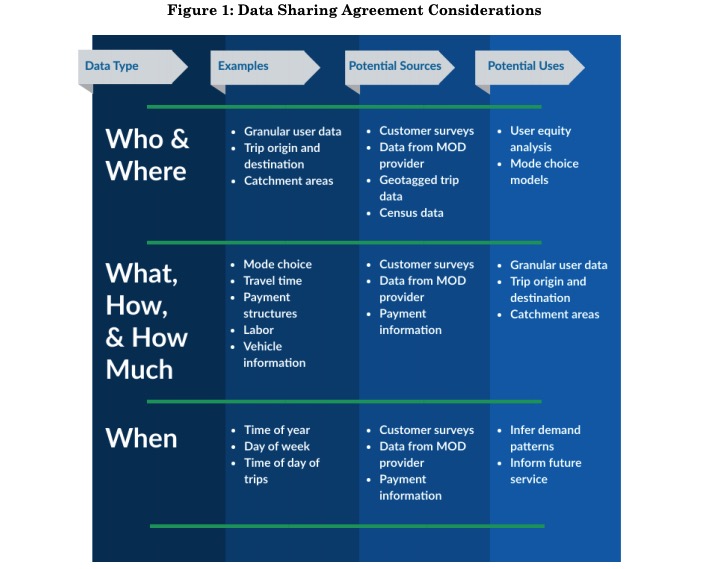ENO CENTER FOR TRANSPORTATION
Data on Demand is the second paper in our research report series examining the Case Study in the Los Angeles and Puget Sound Regions.
 Transit agencies across the country are testing mobility-on-demand (MOD) projects in order to evaluate whether or how such pilots could be part of their long-term service plans. This includes integrating private options into agencies existing trip planning applications, using a private operator for on-demand first/last mile (FMLM) connections to transit stops, and providing real-time flexible route service to replace underutilized transit routes. Importantly, these private companies have access to detailed data about how their network operates within the overall transportation system. Public access to those data is crucial for good service planning, operations, accounting, and evaluation.
Transit agencies across the country are testing mobility-on-demand (MOD) projects in order to evaluate whether or how such pilots could be part of their long-term service plans. This includes integrating private options into agencies existing trip planning applications, using a private operator for on-demand first/last mile (FMLM) connections to transit stops, and providing real-time flexible route service to replace underutilized transit routes. Importantly, these private companies have access to detailed data about how their network operates within the overall transportation system. Public access to those data is crucial for good service planning, operations, accounting, and evaluation.
Accurate, granular data are necessary to assess MOD projects and pilots and to measure progress towards identified goals and objectives. Agreements to share data between private and public partners are the backbone of successful MOD projects since they outline agreed-upon parameters for data ownership, access, storage, and usage. Starting with research and service goals for MOD projects, as well as the data needed to meet those goals, helps agencies tackle the challenges associated with collecting and sharing data by setting clear needs and priorities.
Many MOD providers are relatively new private companies often referred to as transportation network companies (TNCs). Differing goals, organizational structures, requirements, and service types between public transit agencies and private MOD providers must be understood and addressed to provide useful, coordinated projects. As more pilots and partnerships emerge, so are a useful set of best practices and lessons learned for how data should be shared between transit agencies and MOD providers.
This report examines the data needs that agency staff need to consider when developing a MOD agreement with private providers. Background information on elements of data sharing in this context includes general state of the practice, and challenges and opportunities for transit agencies. The FTA Mobility on Demand Sandbox project in the Los Angeles and Puget Sound regions serves as a case study with robust data sharing between multiple parties. Both general information and the case study help provide examples of various levels of success in developing and implementing these types of collaborations. The purpose is to inform transit agencies, private MOD providers, and researchers of elements to consider when developing data sharing agreements.
Introduction
Transit agencies across the country are testing mobility-on-demand (MOD) projects in order to evaluate whether or how such pilots could be part of their long-term service plans. This includes integrating private options into agencies existing trip-planning applications, using a private operator for on-demand first/last mile (FMLM) connections to transit stops, and providing real-time flexible route service to replace underutilized transit routes. Importantly, these private companies have access to detailed data about how their network operates within the overall transportation system. Public access to those data is crucial for good service planning, operations, accounting, and evaluation.
Accurate, granular data are necessary to assess MOD projects and pilots and to measure progress towards identified goals and objectives. Agreements to share data between private and public partners are the backbone of successful MOD projects since they outline agreed-upon parameters for data ownership, access, storage, and usage. Starting with research and service goals for MOD projects, as well as the data needed to meet those goals, helps agencies tackle the challenges associated with collecting and sharing data by setting clear needs and priorities.
Many MOD providers are relatively new private companies often referred to as transportation network companies (TNCs).2 Differing goals, organizational structures, requirements, and service types between public transit agencies and private MOD providers must be understood and addressed to provide useful, coordinated projects. As more pilots and partnerships emerge, so are a useful set of best practices and lessons learned for how data should be shared between transit agencies and MOD providers.
Combining existing data as well as new data sets—such as observed and survey data—can provide a robust project evaluation framework. Quantitative evaluation, in conjunction with qualitative evaluation, helps inform planning, funding, partnering, and service decision-making to reach agency goals. In order to measure progress, Figure 1 shows examples of what types of data can be collected from various sources and how they can be used in the context of evaluating a transportation program that provides enhanced transit station access.
This report examines the data needs that agency staff need to consider when developing a MOD agreement with private providers. Background information on elements of data sharing in this context includes general state of the practice, and challenges and opportunities for transit agencies. The FTA Mobility on Demand Sandbox project in the Los Angeles and Puget Sound regions serves as a case study with robust data sharing between multiple parties. Both general information and the case study help provide examples of various levels of success in developing and implementing these types of collaborations. The purpose is to inform transit agencies, private MOD providers, and researchers of elements to consider when developing data sharing agreements.
Download full version (EnoTrans.com): Data on Demand
About the Eno Center for Transportation
www.enotrans.org
Eno is a non-profit charitable foundation, recognized by the IRS as a 501(c)(3). The Eno Center for Transportation (Eno) was founded in 1921 by William Phelps Eno (1859-1945), who pioneered the field of traffic management in the United States and Europe. Mr. Eno sought to promote safe mobility by ensuring that traffic control became an accepted role of government and traffic engineering became a recognized professional discipline.
Tags: About the Eno Center for Transportation, CA, California, Data, Los Angeles, Puget Sound, WA, Washington







 RSS Feed
RSS Feed